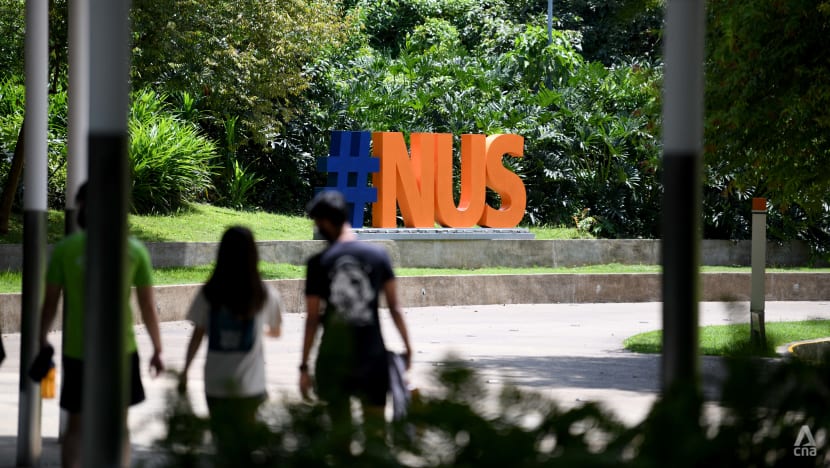Former NUS researcher admits making false claims for S$40,000 over 8 years

File photo of signage as seen at the National University of Singapore. (Photo: CNA/Calvin Oh)
SINGAPORE: Over a period of eight years, a research fellow made almost S$40,000 worth of false claims from the National University of Singapore (NUS).
To cover his tracks, Thomas Teh Kok Hiong, 42, doctored receipts and invoices to justify the false claims for personal purchases and purchases he did not actually make.
On Tuesday (Jun 14), he pleaded guilty to five counts of cheating and two counts of forgery. Another 20 charges will be considered when he returns for sentencing in July.
PERSONAL AND FICTITIOUS PURCHASES
Investigations showed that Teh submitted expense reports containing false or inflated claims and claims for expenses that he did not incur, but were, for example, incurred by his family members.
Between October 2010 and September 2018, Teh submitted 22 expense reports and duped NUS into reimbursing him close to S$40,000 for expenses he claimed were for research purposes.
He also admitted to forging payment documents to get approval for claims on two occasions.
In October 2017, Teh engaged a shop to install solar film for his car and paid S$300 for the personal purchase.
He then used a blank invoice issued by the shop and reflected S$4,815 as the price for "UV protective film for lab hood and cabinets", which he submitted to NUS.
In January 2018, he entered S$2,820 into a blank cash sale document to support an expense claim for research equipment. He had actually spent about S$1,000 on a labeller and radio for his own use.
Court documents did not say how Teh's offences were discovered.
Teh, who was with NUS' Department of Biomedical Engineering at the time of the offences, is no longer with the university, his defence lawyer told the court.
He has since made full restitution to the university.
PROSECUTION AND DEFENCE ARGUMENTS
Deputy Public Prosecutor V Jesudevan sought 24 weeks' jail, arguing that Teh cheated a public institution and there was a need to deter like-minded offenders.
He urged the court to disregard a report by the defence's psychiatrist, which said that Teh suffers from obsessive-compulsive disorder that had a contributory link to the offences.
Mr Jesudevan argued that the psychiatrist's report was "unreliable" and that the defence had not aided the court in understanding the severity of Teh's mental condition.
Defence lawyer Tan Hee Joek argued that the key mitigating factors were Teh's full restitution to NUS and the psychiatrist's report, which would explain some of Teh's "rather bizarre behaviour" over the years.
This behaviour included his purchases of items that he did not need, said Mr Tan.
The lawyer also said his client had expressed remorse and fully cooperated in investigations by the Corrupt Practices Investigation Bureau and NUS.
District Judge Christopher adjourned sentencing to consider how much weight should be given to the psychiatrist's report.
The penalty for cheating is up to three years' jail, a fine or both, while the punishment for forgery is up to four years' jail, a fine or both.












